一般现在时与一般过去时的讲解与练习
一般现在时和一般过去时

一般现在时讲解及练习1、定义与讲解一般现在时:表示经常性的事情,经常性的动作或一般性事实。
时间状语:often 经常,usually通常,always 总是,every+名词每个,sometime s 有时,once a week ,on Sundays ,if 的从句at …在几点钟2. 表示客观真理,科学原理,自然现象,等客观事实或格言,谚语等。
The sun rises in the east and sets in the west every day.The man who has never been to the Great Wall is not a real man.Tomorrow is Tuesday.只有在第三人称单数用动词的“三单变化”,其他用动词的原形。
三单变化:(1)直接在动词词尾加-s.ask---asks work---works get---gets stay---stays(2)以字母s, x, ch, sh或o结尾的动词,在词尾直接加-es.watch---watches wish---wishes fix---fixes pass---passes(3)以“辅音字母加- y”结尾的动词,要先变y为i再加-es.try---tries study---studies cry---cries fly---flies play —plays2.不规则变化:be---- is are have----has do---does go---goes三、一般现在时的句子转换:(1)当句子中有be动词或情态动词时,则把be 动词或情态动词(can,could等等)提到主语的前面变成疑问句;在be动词或情态动词后面加not变成否定句陈述句She is a student.疑问句Is she a student? 否定句She is not a student.陈述句:I can swim.疑问句→ Can you swim否定句→ I can not swim.(2)当句子中即没有be动词,也没有情态动词时,则在主语前加助动词do (you,以及复数), does(单数she,he,it)变成问句;在主语后谓语动词前加助动词don’t(I, you,以及复数), doesn’t(单数she,he,it)变成否定句,助动词后的动词要变成动词原形。
一般现在时,现在进行时,一般过去时讲解

一般过去时态〔1〕根本用法1.一般过去时通常用来表示过去发生的动作或存在的状况。
如:--- Where were you last week"上周你在哪儿?--- I was at my uncle's home in the countryside.〔上周〕我在乡下的叔叔家。
2.有些情况,发生时间没有明确标明,但实际上是过去发生的,应用过去时态;另外,在谈到已故去的人时,也多用过去时。
如:He bought a cat, and now they are good friends.他买了一只猫,现在他们是好朋友了。
Lu *un was a great writer.鲁迅是一位伟大的作家。
〔2〕时间状语与一般过去时连用的时间状语有:yesterday〔昨天〕, last night〔昨晚〕, last week〔上个星期〕, four days ago〔四天前〕, in 2002〔在2002年〕, just now〔刚刚〕, the day before yesterday〔前天〕等。
如:He went to the park yesterday.她昨天去了花园。
I was ten years old in 2001.我2001年才10岁。
〔3〕动词的过去式在一般过去时态中会涉及到动词的过去式,大家要掌握规则动词的过去式的变化规则。
其根本的变化规则如下:①一般情况下,在动词原形后直接ed。
如:play –played , look –looked。
②以e结尾的动词在其后加d。
如:like –liked, use –used。
③与辅音字母加y结尾的动词,把y变成i再加ed。
如:carry – carried, marry - married。
④以重读闭音节〔或r音节〕结尾,末尾只有一个辅音字母时,双写这个辅音字母,再加ed。
如:stop –stopped, prefer –preferred。
小学六年级上册英语时态精讲练习
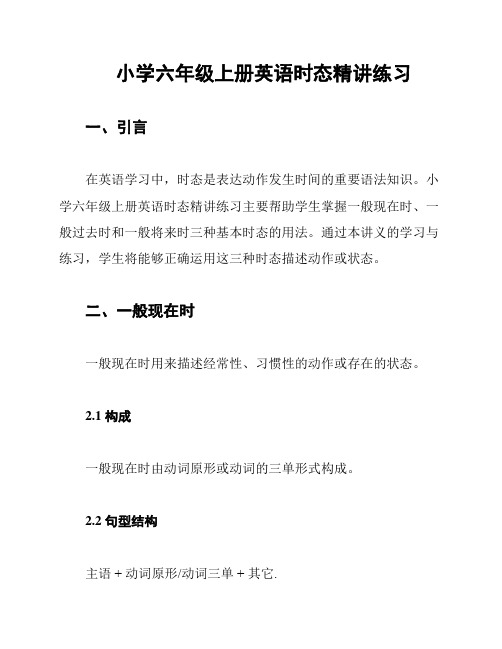
小学六年级上册英语时态精讲练习一、引言在英语学习中,时态是表达动作发生时间的重要语法知识。
小学六年级上册英语时态精讲练习主要帮助学生掌握一般现在时、一般过去时和一般将来时三种基本时态的用法。
通过本讲义的学习与练习,学生将能够正确运用这三种时态描述动作或状态。
二、一般现在时一般现在时用来描述经常性、习惯性的动作或存在的状态。
2.1 构成一般现在时由动词原形或动词的三单形式构成。
2.2 句型结构主语 + 动词原形/动词三单 + 其它.2.3 练习1. I (eat)_____ breakfast every morning.2. She (go)_____ to school by bus.3. The cat (sleep)_____ on the sofa.三、一般过去时一般过去时用来描述过去发生的动作或存在的状态。
3.1 构成一般过去时由动词的过去式构成。
3.2 句型结构主语 + 动词过去式 + 其它.3.3 练习1. I (watch)_____ a movie yesterday.2. She (visit)_____ her grandparents last week.3. They (play)_____ soccer in the park.四、一般将来时一般将来时用来描述将来要发生的动作或存在的状态。
4.1 构成一般将来时有两种构成方式:will + 动词原形和 be going to + 动词原形。
4.2 句型结构1. 主语 + will + 动词原形 + 其它.2. 主语 + be going to + 动词原形 + 其它.4.3 练习1. I (buy)_____ a new bike next month.2. She (travel)_____ to Japan with her family.3. They (move)_____ to a new house in two years.五、总结通过本讲义的学习与练习,学生应掌握一般现在时、一般过去时和一般将来时三种基本时态的构成、句型结构和用法。
一般现在时和一般过去时讲解及练习
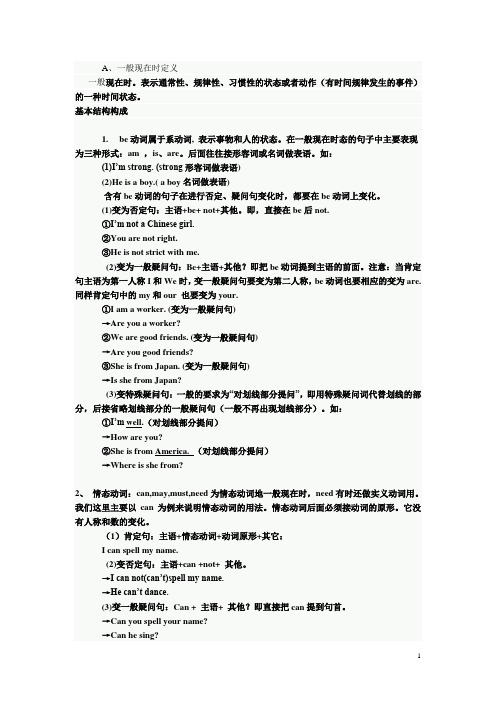
A、一般现在时定义一般现在时。
表示通常性、规律性、习惯性的状态或者动作(有时间规律发生的事件)的一种时间状态。
基本结构构成1. be动词属于系动词, 表示事物和人的状态。
在一般现在时态的句子中主要表现为三种形式:am ,is、are。
后面往往接形容词或名词做表语。
如:(1)I’m strong. (strong形容词做表语)(2)He is a boy.( a boy名词做表语)含有be动词的句子在进行否定、疑问句变化时,都要在be动词上变化。
(1)变为否定句:主语+be+ not+其他。
即,直接在be后not.①I’m not a Chinese girl.②You are not right.③He is not strict with me.(2)变为一般疑问句:Be+主语+其他?即把be动词提到主语的前面。
注意:当肯定句主语为第一人称I和We时,变一般疑问句要变为第二人称,be动词也要相应的变为are.同样肯定句中的my和our 也要变为your.①I am a worker. (变为一般疑问句)→Are you a worker?②We are good friends. (变为一般疑问句)→Are you good friends?③She is from Japan. (变为一般疑问句)→Is she from Japan?(3)变特殊疑问句:一般的要求为“对划线部分提问”,即用特殊疑问词代替划线的部分,后接省略划线部分的一般疑问句(一般不再出现划线部分)。
如:①I’m well.(对划线部分提问)→How are you?②She is from America. (对划线部分提问)→Where is she from?2、情态动词:can,may,must,need为情态动词地一般现在时,need有时还做实义动词用。
我们这里主要以can为例来说明情态动词的用法。
情态动词后面必须接动词的原形。
语法:1-3一般现在时、过去时、将来时讲析与练习
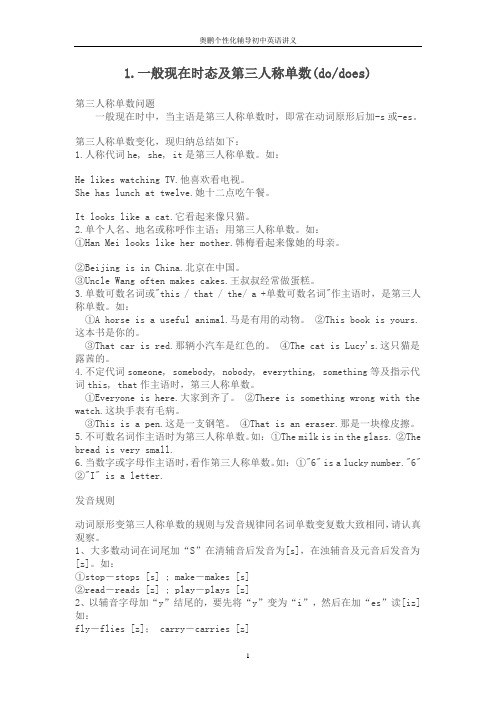
1.一般现在时态及第三人称单数(do/does)第三人称单数问题一般现在时中,当主语是第三人称单数时,即常在动词原形后加-s或-es。
第三人称单数变化,现归纳总结如下:1.人称代词he, she, it是第三人称单数。
如:He likes watching TV.他喜欢看电视。
She has lunch at twelve.她十二点吃午餐。
It looks like a cat.它看起来像只猫。
2.单个人名、地名或称呼作主语;用第三人称单数。
如:①Han Mei looks like her mother.韩梅看起来像她的母亲。
②Beijing is in China.北京在中国。
③Uncle Wang often makes cakes.王叔叔经常做蛋糕。
3.单数可数名词或"this / that / the/ a +单数可数名词"作主语时,是第三人称单数。
如:①A horse is a useful animal.马是有用的动物。
②This book is yours.这本书是你的。
③That car is red.那辆小汽车是红色的。
④The cat is Lu cy's.这只猫是露茜的。
4.不定代词someone, somebody, nobody, everything, something等及指示代词this, that作主语时,第三人称单数。
①Everyone is here.大家到齐了。
②There is something wrong with the watch.这块手表有毛病。
③This is a pen.这是一支钢笔。
④That is an eraser.那是一块橡皮擦。
5.不可数名词作主语时为第三人称单数。
如:①The milk is in the glass. ②The bread is very small.6.当数字或字母作主语时,看作第三人称单数。
初中英语时态讲解及练习(全)

时间状语:Tomorrow, next day(week, month, year…),soon, in a few minutes, by…,the day after tomorrow, etc.
否定形式:主语+am/is/are not going to do ; 主语+will/shall not do+其他 一般疑问句:be放于句首;will/shall提到句首。
1.I ____(write, am writing, is writing, are writing) a letter now. 2.Look, it _____(begin, is beginning, am beginning, are beginning) to rain. 3.They ____(study, is studying, am studying, are studying) medicine at the Medical Institute of Chengde these days. 4.He _____(teach, am teaching, is teaching, are teaching) an English lesson at this time.
谓语动词使用过去式形式, 加ed,分为规则和不规则变 化。表示过去经常发生的动 作,也可用“used to do ” 和“would +动词原形”。
1. He____(be, was, were, been) here a moment ago. 2. They ____(be, was, were, been) here just now. 3. The scientists _____(leave, leaves, leaved, left) for America yesterday. 4. Last week we ______(visit, visited ) the Science Museum. 5. When I was a child, I often ____(play, played) football. 6. The students ran out of the classroom as soon as the bell ____(ring, rang, rung).
人教版初中英语七年级下册unit 11 过去式 知识点讲解与练习

人教版初中英语七年级下册unit 11 过去式知识点讲解与练习语法:一般过去时一、什么是一般过去时?一般过去时是用于表述“过去”的时态。
1. 表示过去发生的动作。
2. 表示过去发生的状态。
二、一般现在时与一般过去时的共同点一般过去时的句式在结构上与一般现在时的句式结构是完全相同的。
无论是陈述句还是疑问句均是如此。
因而学好了一般现在时的知识,再学习一般过去时的知识是非常容易的。
一、be动词。
1)肯定句。
I am a student. —> I was a student.You are young. —> You were young.2)否定句。
I am not a student. —> I was not a student.You are not young. —> You were not young.二、实意动词作谓语的情况。
1)肯定句。
I read books in the park. —> I read books in the park.(思考:为何看上去这个例句没有发生任何变化呢?答:因为read的过去式也为read,其拼写虽相同,但读音不同。
)He usually gets up at 7 a.m.—> He usually got up at 7 a.m.(注意:一般过去时中没有所谓的“三单变化规则”,因为一般过去时是没有人称和数的变化的)She helps me with my homework.—> She helped me with my homework.They want to ask you a question.—> They wanted to ask you a question.总结:此类结构中,将单独作谓语的实意动词变为其过去式,句子的时态即变成了一般过去时。
(实意动词单独作谓语的一般过去时没有人称和数的变化。
一般现在时现在进行时一般过去时讲解

一般过去时态(1)基本用法1.一般过去时通常用来表示过去发生的动作或存在的状况。
如:--- Where were you last week上周你在哪儿--- I was at my uncle's home in the countryside.(上周)我在乡下的叔叔家。
2.有些情况,发生时间没有明确标明,但实际上是过去发生的,应用过去时态;另外,在谈到已故去的人时,也多用过去时。
如:He bought a cat, and now they are good friends.他买了一只猫,现在他们是好朋友了。
Lu Xun was a great writer.鲁迅是一位伟大的作家。
(2)时间状语与一般过去时连用的时间状语有:yesterday(昨天), last night(昨晚), last week(上个星期), four days ago(四天前), in 2002(在2002年), just now(刚才), the day before yesterday(前天)等。
如:He went to the park yesterday.她昨天去了花园。
I was ten years old in 2001.我2001年才10岁。
(3)动词的过去式在一般过去时态中会涉及到动词的过去式,大家要掌握规则动词的过去式的变化规则。
其基本的变化规则如下:①一般情况下,在动词原形后直接ed。
如:play –played , look –looked。
②以e结尾的动词在其后加d。
如:like –liked, use –used。
③与辅音字母加y结尾的动词,把y变成i再加ed。
如:carry –carried, marry - married。
④以重读闭音节(或r音节)结尾,末尾只有一个辅音字母时,双写这个辅音字母,再加ed。
如:stop –stopped, prefer –preferred。
当然,刚才提到的都是规则动词的构成,我们还学过许多不规则动词的过去式形式。
初中英语语法一般现在时、将来时、过去时讲解及练习题
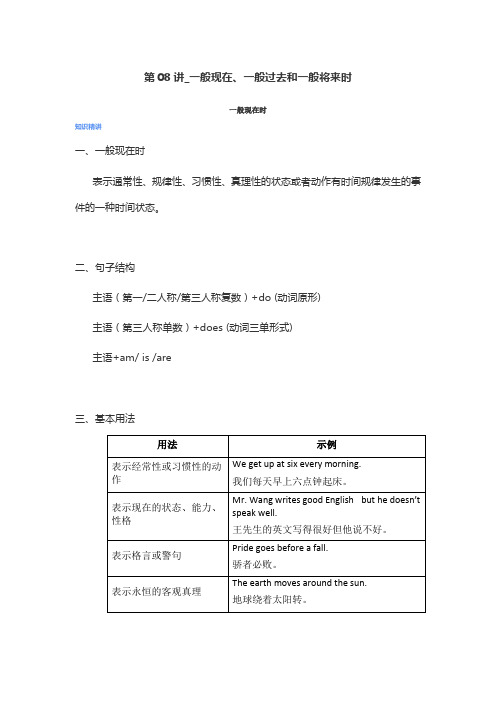
一般现在时知识精讲一、一般现在时表示通常性、规律性、习惯性、真理性的状态或者动作有时间规律发生的事件的一种时间状态。
二、句子结构主语(第一/二人称/第三人称复数)+do (动词原形)主语(第三人称单数)+does (动词三单形式)主语+am/ is /are三、基本用法四、时间状语1. 表示频率的副词: always, usually, often, sometimes, never, hardly, seldom…2. every/once+名词: every day/ week/ year, once a week/ month …3. 表示时间的短语: twice a day, on weekends, on Mondays…五、一般现在时动词三单的变化规律六、相关句式三点剖析一、考点:时态是英语学习中的核心内容之一,是英语学习的基础。
自然,时态考查是各种英语考试尤其是中考时的座上宾。
动作发生的时间决定时态,时态决定动词的形式,而考卷中的时态题通常没有给出明确的时间标志词,考试需领悟所提供的语境来做出判断。
只有推断出动作发出的正确时间,才可能正确答题,这就要求考生在熟练掌握时态结构、用法并牢记常用的时间状语的基础上,要充分利用上下文中隐含的信息来捕捉时间,找准答题的突破口。
二、重难点:一般现在时在考试中的重难点是:句子结构、基本用法、标志时间状语、动词三单的变化规则及相关句式的变化。
三、补充点:1. 表示按计划或安排好的,或将要发生的动作,可用一般现在时表将来。
但只限于start, begin, leave, go, come, arrive, return, take place等。
例:My train leaves at 7:00 this afternoon.我乘坐的火车将在今天下午7点离开。
2. 在复合句中,当主句是一般将来时,时间或条件状语从句的谓语动词只能用一般现在时来表示将来要发生的动作。
七年级下册英语时态专项-一般现在时-现在进行时-一般过去时-讲解与测试

一、一般现在时:概念:经常、反复发生的动作或行为及现在的某种状况。
时间状语:always, usually, often, sometimes, every week (day, year, month…), once a week, on Sundays, etc.基本结构:①be动词;②行为动词否定形式:①am/is/are+not;(isn't,aren't)②此时态的谓语动词若为行为动词,则在其前加don't,如主语为第三人称单数,则用doesn't,同时还原行为动词。
一般疑问句:①把be动词放于句首;②用助动词do提问,如主语为第三人称单数,则用does,同时,还原行为动词。
即:含be动词的一般现在时结构:肯定句:主语+ be+ 其它。
否定句:主语+ be+not + 其它。
一般问句:Be+主语+ 其它特殊疑问句:(特殊疑问词+一般疑问句)特殊疑问词+be+主语+其它含实义动词的一般现在时结构:肯定句:主语+动词原形/动词三单形式+其它。
否定句:主语+don't/doesn't+动词原形+其它。
一般问句:Do/Does+主语+动词原形+其它特殊疑问句:(特殊疑问词+一般疑问句)特殊疑问词+do/does+主语+动词原形+其它一、写出下列动词的单三形式:(一)2. catch _________3. brush_________4. wash___________5. do________6. like________7. have___________8. watch ___________9. drink ___________ ___________brush________(二)study_______ stay _____ make ___look ____ pass____ carry ____ come_______ watch_____ plant______ teach_______二、用括号内动词的适当形式填空。
英语一般现在时和一般过去时讲解+练习
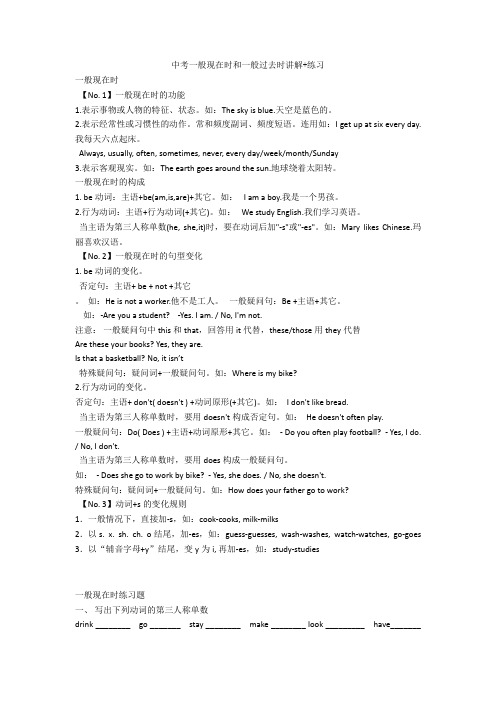
中考一般现在时和一般过去时讲解+练习一般现在时【No. 1】一般现在时的功能1.表示事物或人物的特征、状态。
如:The sky is blue.天空是蓝色的。
2.表示经常性或习惯性的动作。
常和频度副词、频度短语。
连用如:I get up at six every day.我每天六点起床。
Always, usually, often, sometimes, never, every day/week/month/Sunday3.表示客观现实。
如:The earth goes around the sun.地球绕着太阳转。
一般现在时的构成1. be动词:主语+be(am,is,are)+其它。
如: I am a boy.我是一个男孩。
2.行为动词:主语+行为动词(+其它)。
如: We study English.我们学习英语。
当主语为第三人称单数(he, she,it)时,要在动词后加"-s"或"-es"。
如:Mary likes Chinese.玛丽喜欢汉语。
【No. 2】一般现在时的句型变化1. be动词的变化。
否定句:主语+ be + not +其它。
如:He is not a worker.他不是工人。
一般疑问句:Be +主语+其它。
如:-Are you a student? -Yes. I am. / No, I'm not.注意:一般疑问句中this和that,回答用it代替,these/those 用they代替Are these your books? Yes, they are.Is that a basketball? No, it isn’t特殊疑问句:疑问词+一般疑问句。
如:Where is my bike?2.行为动词的变化。
否定句:主语+ don't( doesn't ) +动词原形(+其它)。
如: I don't like bread.当主语为第三人称单数时,要用doesn't构成否定句。
一般现在时与一般过去时的区别初中语法重点解析

一般现在时与一般过去时的区别初中语法重点解析一般现在时和一般过去时是英语语法中两种最基本的时态。
它们在使用上有所不同,主要表达现在和过去的动作或状态。
本文将对这两种时态的区别进行初中语法重点解析。
一、一般现在时一般现在时用于描述经常性、习惯性或普遍性的动作或状态。
1. 基本句式结构:主语 + 动词的原形(一般动词加-s或-es)2. 表达经常性习惯的词语:常常(often)、通常(usually)、有时候(sometimes)、总是(always)等。
3. 示例:- I often go to the park on weekends.(我经常在周末去公园。
)- She usually reads books before bedtime.(她通常在睡前看书。
)二、一般过去时一般过去时用于描述过去发生的动作或状态。
1. 基本句式结构:主语 + 动词的过去式形式2. 表达过去的时间段词语:昨天(yesterday)、上个月(last month)、去年(last year)等。
3. 示例:- We visited our grandparents last weekend.(上个周末我们去看望了祖父母。
)- It rained heavily yesterday.(昨天下了一场大雨。
)三、一般现在时与一般过去时的区别1. 时间参照点:一般现在时是以现在为参照点,即描述现在或经常性的动作或状态;而一般过去时以过去某个具体时间为参照点,描述过去已经发生的动作或状态。
2. 动词形式变化:一般现在时中,动词一般保持原形,但第三人称单数要加上-s或-es。
而一般过去时中,动词需变为过去式形式。
3. 时间状语的使用:一般现在时通常结合时间状语词或者副词来表示经常性的动作或状态;而一般过去时则结合过去的时间段词语。
4. 示例比较:- 现在:- I often play basketball in the park.(我经常在公园打篮球。
中考英语备课指导:一般现在时和一般过去时讲解+练习
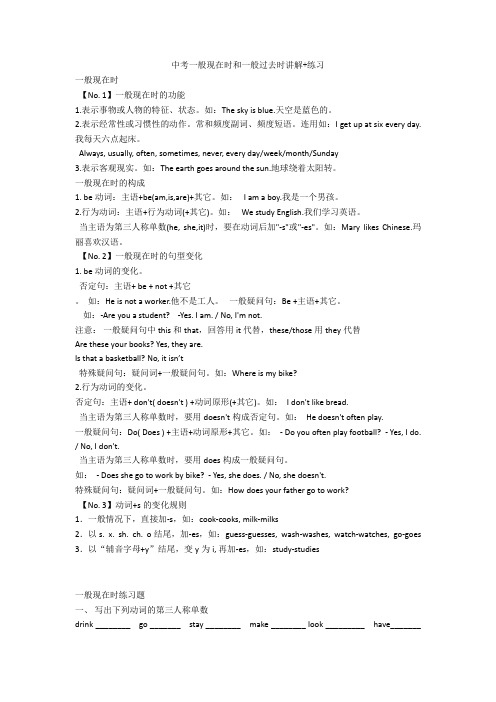
中考一般现在时和一般过去时讲解+练习一般现在时【No. 1】一般现在时的功能1.表示事物或人物的特征、状态。
如:The sky is blue.天空是蓝色的。
2.表示经常性或习惯性的动作。
常和频度副词、频度短语。
连用如:I get up at six every day.我每天六点起床。
Always, usually, often, sometimes, never, every day/week/month/Sunday3.表示客观现实。
如:The earth goes around the sun.地球绕着太阳转。
一般现在时的构成1. be动词:主语+be(am,is,are)+其它。
如: I am a boy.我是一个男孩。
2.行为动词:主语+行为动词(+其它)。
如: We study English.我们学习英语。
当主语为第三人称单数(he, she,it)时,要在动词后加"-s"或"-es"。
如:Mary likes Chinese.玛丽喜欢汉语。
【No. 2】一般现在时的句型变化1. be动词的变化。
否定句:主语+ be + not +其它。
如:He is not a worker.他不是工人。
一般疑问句:Be +主语+其它。
如:-Are you a student? -Yes. I am. / No, I'm not.注意:一般疑问句中this和that,回答用it代替,these/those 用they代替Are these your books? Yes, they are.Is that a basketball? No, it isn’t特殊疑问句:疑问词+一般疑问句。
如:Where is my bike?2.行为动词的变化。
否定句:主语+ don't( doesn't ) +动词原形(+其它)。
如: I don't like bread.当主语为第三人称单数时,要用doesn't构成否定句。
初中英语语法:一般现在时、一般过去时和一般将来时
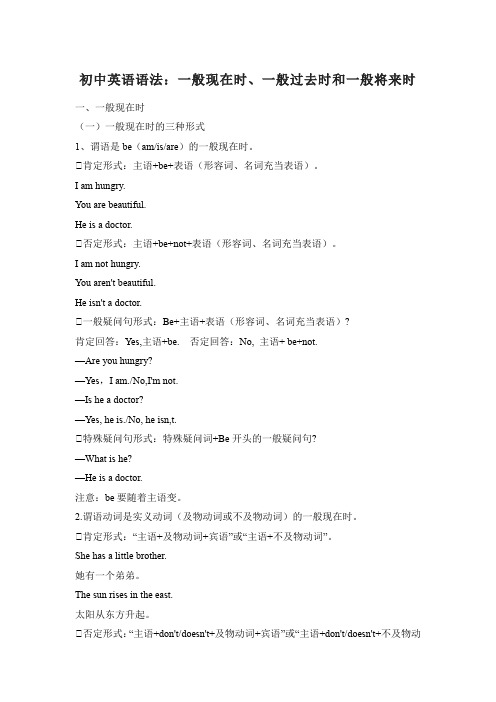
初中英语语法:一般现在时、一般过去时和一般将来时一、一般现在时(一)一般现在时的三种形式1、谓语是be(am/is/are)的一般现在时。
①肯定形式:主语+be+表语(形容词、名词充当表语)。
I am hungry.You are beautiful.He is a doctor.①否定形式:主语+be+not+表语(形容词、名词充当表语)。
I am not hungry.You aren't beautiful.He isn't a doctor.①一般疑问句形式:Be+主语+表语(形容词、名词充当表语)?肯定回答:Yes,主语+be. 否定回答:No, 主语+ be+not.—Are you hungry?—Yes,I am./No,I'm not.—Is he a doctor?—Yes, he is./No, he isn,t.①特殊疑问句形式:特殊疑问词+Be开头的一般疑问句?—What is he?—He is a doctor.注意:be要随着主语变。
2.谓语动词是实义动词(及物动词或不及物动词)的一般现在时。
①肯定形式:“主语+及物动词+宾语”或“主语+不及物动词”。
She has a little brother.她有一个弟弟。
The sun rises in the east.太阳从东方升起。
①否定形式:“主语+don't/doesn't+及物动词+宾语”或“主语+don't/doesn't+不及物动词”。
She doesn't have a little brother.她没有弟弟。
I don't eat every morning.我每天早晨都不吃饭。
①一般疑问句形式:“Do/Does+主语+及物动词原形+宾语”或“Do/Does+主语+不及物动词原形”。
肯定回答:Yes,主语+do/does. 否定回答是:No, 主语+ don't/doesn't.—Do you eat every morning?—Yes, I do./No, I don't.—Does she have a little brother?—Yes, she does./No, she doesn't.①特殊疑问句:特殊疑问词+do/does开头的一般疑问句?What do you like?When do you go to school?注意:根据主语确定用do还是does。
初中英语八大时态的详细讲解与练习
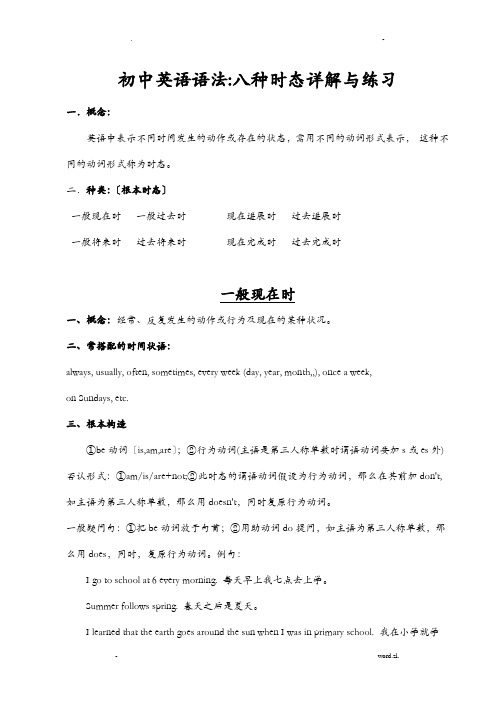
初中英语语法:八种时态详解与练习一.概念:英语中表示不同时间发生的动作或存在的状态,需用不同的动词形式表示,这种不同的动词形式称为时态。
二.种类:〔根本时态〕一般现在时一般过去时现在进展时过去进展时一般将来时过去将来时现在完成时过去完成时一般现在时一、概念:经常、反复发生的动作或行为及现在的某种状况。
二、常搭配的时间状语:always, usually, often, sometimes, every week (day, year, month…), once a week,on Sundays, etc.三、根本构造①be动词〔is,am,are〕;②行为动词(主语是第三人称单数时谓语动词要加s或es外) 否认形式:①am/is/are+not;②此时态的谓语动词假设为行为动词,那么在其前加don't,如主语为第三人称单数,那么用doesn't,同时复原行为动词。
一般疑问句:①把be动词放于句首;②用助动词do提问,如主语为第三人称单数,那么用does,同时,复原行为动词。
例句:I go to school at 6 every morning. 每天早上我七点去上学。
Summer follows spring. 春天之后是夏天。
I learned that the earth goes around the sun when I was in primary school. 我在小学就学过地球是围绕太阳转的。
Pride goes before a fall. 骄者必败。
四、根本用法:1) 描述当前时间经常出现、反复发生的动作或存在的状态。
在这种情景中,句子常带有表示频率的时间状语:always , everyday , often , once a week (month , year , etc.) , sometimes , seldom , usually等等,以表示句中的动作或状态是习惯性的、经常性的。
一般现在时与一般过去时的讲解与练习
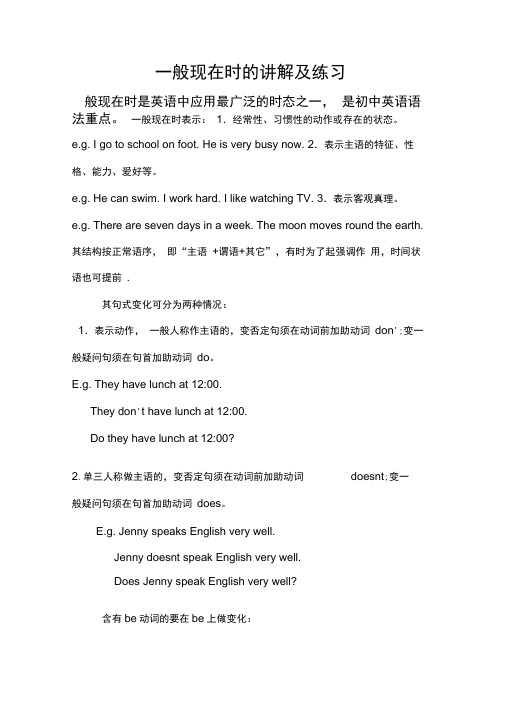
一般现在时的讲解及练习般现在时是英语中应用最广泛的时态之一,是初中英语语法重点。
一般现在时表示:1.经常性、习惯性的动作或存在的状态。
e.g. I go to school on foot. He is very busy now. 2.表示主语的特征、性格、能力、爱好等。
e.g. He can swim. I work hard. I like watching TV. 3.表示客观真理。
e.g. There are seven days in a week. The moon moves round the earth. 其结构按正常语序,即“主语+谓语+其它”,有时为了起强调作用,时间状语也可提前.其句式变化可分为两种情况:1.表示动作,一般人称作主语的,变否定句须在动词前加助动词don';变一般疑问句须在句首加助动词do。
E.g. They have lunch at 12:00.They don't have lunch at 12:00.Do they have lunch at 12:00?2.单三人称做主语的,变否定句须在动词前加助动词doesnt;变一般疑问句须在句首加助动词does。
E.g. Jenny speaks English very well.Jenny doesnt speak English very well.Does Jenny speak English very well?含有be动词的要在be上做变化:E.g. Danny is a good student.Danny isn't a good student.Is Danny a good student?其时间状语为often、usually、always、sometimes等频率副词,on Saturdays、in the morning(afternoon evening) 、every day 等。
一般过去时现在进行时一般现在时时态讲解、练习

3.末尾只有一个元音字母和一个辅 音字母的重读闭音节,应双写末尾的辅 音字母,再加-ed,如:stop-stopped 4.以“辅音字母 +y”结尾的,变y 为i, 再加-ed,如:study-studied
am,is-was, are-were, do-did, seesaw, say-said, give-gave, get-got, gowent, come-came, have-had, eat-ate, take-took, run-ran, sing-sang, putput, make-made, read-read, writewrote, draw-drew, drink-drank, swimswam, sit-sat ,sweep-swept
I didn’t go to school yesterday.
_______________________________________________
Did she play volleyball just now.
3、特殊疑问句由疑问词+did+主语+动词原形组成。
如:They visited the farm last Sunday.(对划线部分提问)
did danced does_________ dance________ worried asked worry________ ask _____ ate tasted taste_________ eat__________ put put ______ passed do kicked kick_________ pass_______ did ________
Where did they visit the farm? ____________________________________________
- 1、下载文档前请自行甄别文档内容的完整性,平台不提供额外的编辑、内容补充、找答案等附加服务。
- 2、"仅部分预览"的文档,不可在线预览部分如存在完整性等问题,可反馈申请退款(可完整预览的文档不适用该条件!)。
- 3、如文档侵犯您的权益,请联系客服反馈,我们会尽快为您处理(人工客服工作时间:9:00-18:30)。
一般现在时的讲解及练习一般现在时是英语中应用最广泛的时态之一,是初中英语语法重点。
一般现在时表示:1.经常性、习惯性的动作或存在的状态。
e.g. I go to school on foot. He is very busy now.2.表示主语的特征、性格、能力、爱好等。
e.g. He can swim. I work hard. I like watching TV.3.表示客观真理。
e.g. There are seven days in a week. The moon moves round the earth.其结构按正常语序,即“主语+谓语+其它”,有时为了起强调作用,时间状语也可提前.其句式变化可分为两种情况:1.表示动作,一般人称作主语的,变否定句须在动词前加助动词don’t;变一般疑问句须在句首加助动词do。
E.g. They have lunch at 12:00.They don’t have lunch at 12:00.Do they have lunch at 12:00?2.单三人称做主语的,变否定句须在动词前加助动词doesn’t;变一般疑问句须在句首加助动词does。
E.g. Jenny speaks English very well.Jenny doesn’t speak English very well.Does Jenny speak English very well?含有be动词的要在be上做变化:E.g. Danny is a good student.Danny isn’t a good student.Is Danny a good student?其时间状语为often、usually、always、sometimes等频率副词,on Saturdays、 in the morning(afternoon evening) 、every day 等。
常见错误如下:一、be动词与行为动词同时出现在句子中例:We are plant (plant) the trees in spring.答案:plant解析:学生往往会用汉语的思维方式去翻译,就成了“我们是在春天植树”。
这是学习英语最忌讳的,要看语法是不是正确,在英语中,be是表状态,do是表动作,两种动词不能同时出现在句子中,可记住如下口诀:“英汉语言有差异,be 、do不能放一起,仔细琢磨细分析,语法千万要牢记。
”自我检测:(一)、单选1. Jenny ____ in an office. Her parents ____in a hospital.A work; worksB works; workC work; are workingD is working; work2. One of the boys_____ a black hat.A haveB there isC there areD has3. We will go shopping if it____ tomorrow.A don't rainB didn't rainC doesn't rainD isn't rain4. He said the sun ____in the east and ____in the west.A rose; setB rises; setsC rises, setD rise; sets5. Wang Mei ____ music and often ____ to music.A like; listenB likes; listensC like; are listeningD liking ; listen6. Jenny____ English every evening.A has studyB studiesC studyD studied答案:1 B 2D 3C 4B 5B 6B(二)、填空1 I can take Li Ming there when he _____ (come) to visit.2 _____your sister_____(know)English?3Her home____ _____ ______(远离 )her school.4The pot_____(not look) like yours very much.5 Where _____you____(have)lunch every day?6 Who_____(想要)to go swimming?7 ______she_____(do) the housework every day?8 Jenny and Danny usually______(play) games in the afternoon . 答案:1 comes 2 Does know 3 is away from 4 doesn't look二、单三人称形式易出错例:1 He plaies (play) football very well.2 Danny gos (go) to school at 7:10.答案:1 plays 2 goes解析:1以辅音字母加y结尾的动词变单三人称形式才能把y换成i再加es;2与名词变复数不同,变单三人称形式以o结尾的词要加es.三、在句式变换时易出错例:1 Does Jenny has (has) a good friend?2 Brian doesn’t lives (not live) in China.答案:1 Does have 2 doesn’t live解析:单三人称做主语的一般现在时做句式变化时,可记住如下口诀:“见助动,用原形”。
此口诀也可推广用于一般过去时态中。
e.g. He didn't go home yesterday.四、对do的理解易出错例:We don’t (not do) our homework in the afternoon.答案:don’t do解析:do是一个比较难理解的词,它有三个含义:a)是所有行为动词的总称;b)是助动词,无实义;c)是一个具体的行为动词“做,干”。
此句中给出的do指“做,干”,not指把此句变为否定句,故须在do前加助动词don’t。
五、对主语的数判断有误例: Li Ming with me are (be) in Beijing.答案: is解析:表面一看是“我和李明两个人在北京”,但with在此做伴随状语,不能做主语,故用is.另外,宾语从句中,从句部分若是表示客观真理,不管主句是何时态,从句都要用一般现在时;在时间和条件状语从句中,主句表将来,从句要用一般现在时。
一般过去式的讲解与练习一般过去式表示过去的动作和状态。
如:I met him yesterday. 昨天我碰见了他。
一般过去式构成:表示一般过去式的动词通常用动词的过去式形式来表示,而动词的过去式是在动词原形的基础上变化的。
动词的过去式可分为规则动词和不规则动词。
规则动词的过去式变化如下:一般情况下,动词词尾加 -ed ,如:worked played wanted acted以不发音的 -e 结尾动词,动词词尾加 -d,如: lived moved decided hoped judged raised以辅音字母 + y结尾的动词,把-y变为-i 再加-ed,如:Studied tried copied cried carried以一个辅音字母结尾的重读闭音节动词,双写词尾辅音字母,再加 -ed,如: stopped begged dragged dropped planned dripped注:不规则动词的过去式变化规律性不强,须多加记忆。
go - went make - made get - got buy - bought come - came fly-flew一般过去式的用法:1) 表示过去某一时刻或某一段时间内所发生的动作或情况,通常一般过去式带有表示动作时间状语的词,词组或从句,如yesterday, the day before last, last week, two days ago 等,上下文清楚时可以不带时间状语。
I worked in that factory last year.去年我在那一家工厂工作。
I went to the Tian Long Mountain yesterday.昨天我们去了天龙山。
一般过去时表示(1)过去某个特定时间发生,并且一下子就完成了的动作(即:非持续性动作),(2)可表示过去习惯性的动作。
一般过去时不强调动作对现在的影响,只说明过去。
I had a word with Julia this morning.今天早晨,我跟朱丽亚说了几句话。
He smoked many cigarettes a day until he gave up. 他没有戒烟的那阵子,抽烟抽得可凶了。
一般过去时常与表示过去的时间状语或从句连用,如:yesterday, last week, in 1993, at that time, once, during the war, before, a few days ago, when 等等。
句子中谓语动词是用一般过去时还是用现在完成时,取决于动作是否对现在有影响。
Have you had your lunch? 你吃过午饭了吗?(意思是说你现在不饿吗?)Yes, I have. 是的,我已经吃过了。
(意思是说已经吃饱了,不想再吃了。
)When did you have it? 你是什么时候吃的?(关心的是吃的动作发生在何时。
)I had it about ten minutes ago. 我是大约十分钟以前吃的。
Used to do something 表示过去常做而现在已经停止了的习惯动作。
I used to work fourteen hours a day. 我过去常常一天干十四个小时。
I eaten it at 6:45。
我在六点四十五分吃了。
一般过去时的基本用法1 带有确定的过去时间状语时,要用过去时如:yesterday(昨天)、two days ago…(两天前……)、last year…(去年…)、the other day(前几天)、once up on a time(过去曾经)、just now(刚才)、in the old days(过去的日子里)、before liberation(解放前…)、When I was 8 years old(当我八岁时…)、at+一个时间点Did you have a party the other day?前几天,你们开了晚会了吗?Lei Feng was a good soldier.雷锋是个好战士。
